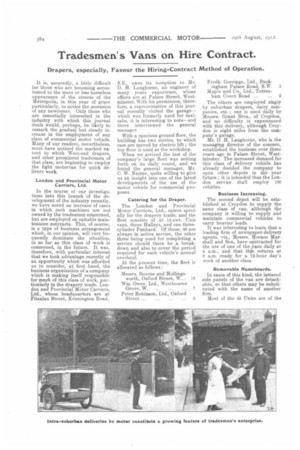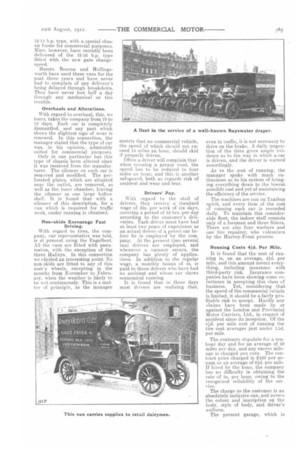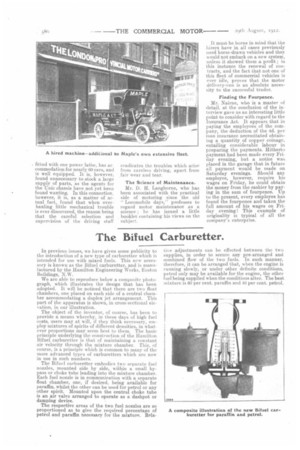Tradesmen s Vans on Hire Contract.
Page 14

Page 15

Page 16

If you've noticed an error in this article please click here to report it so we can fix it.
Drapers, especially, Favour the Hiring-Contract Method of Operation.
It is, assuredly, a little difficult for those who are becoming accustomed to the more or lees horseless appearance of the streets of the Metropolis, in this year of grace particularly, to notice the accession of any newcomer. Only those who are essentially interested in the industry with which this journal deals would, perhaps, be likely to remark the gradual but steady increase in the employment of any class of commercial motor vehicle. Many of our readers, nevertheless, must have noticed the marked extent to which West-end drapers, and other prominent tradesmen of that class, are beginning to employ the light motorv.an for quick delivery work.
London and Provincial Motor Carriers, Ltd.
In the course of our investigations into this branch of the development of the industry recently, we have noted an increase of cases in which such machines are not owned by the tradesmen concerned, but are employed on suitable maintenance contracts. This, of course, is a type of business arrangement which, in our opinion, will very frequently dominate the situation, in so far as this class of work is concerned, in the future. It was, therefore, with particular interest that we took advantage recently of an opportunity which was afforded us to consider, at first hand, the business organization of a company which is making itself responsible for much of this class of work, particularly in the drapery trade. London and Provincial Motor Carriers, Ltd., whose headquarters are at Fitzals.n Street, Kennington Road, S.E. owes its inception to Mr. D. H. Langhorne, an engineer of many years experience, whose offices are at Palace Street, Westminster. With his permission, therefore, a representative of this journal recently visited the garage— which was formerly used for taxicabs, it is interesting to note—and there interviewed the general manager.
With a spacious ground floor, the building has two stories, to which care are moved by electric lift ; the top floor is used as the workshop. When we arrived the last of the company's large fleet was setting forth on its daily round, and we found the general manager, Mr. C. W. Nairne, quite willing to give us an insight into one of the latest developments of the use of the motor vehicle for commercial purposes.
Catering for the Draper.
The London and Provincial Motor Carriers, Ltd., caters specially for the drapery trade, and the fleet consists of 45 15-cwt. Unic vans, three "[alleys, and one threecylinder Panhard. Of these, 46 are always in active service, the other three being used for completing a service should there be a breakdown and also to cover the period required for each vehicle's annual overha.ul.
At the present time, the fleet is allocated as follows : Messrs. Bourne and Hollingsworth, Oxford Street, W.... 18 Wm. Owen, Ltd., Westbourne Grove, W. ... 7 Peter Robinson, Ltd., Oxford Street ... ... 6 Fredk. Gorringe, Ltd., Buckingham Palace Road, S.W. 3 Maple and Co., Ltd., Totten ham Court Road ... 2 The others are employed singly by suburban drapers, dairy companies, etc. ; one is used daily by Messrs. Grant Bros., of Croydon, and no difficulty is experienced with this delivery, although Croydon is eight miles from the company's garage. Mr. D. H. Langhorne, who is the managing director of the concern, established the business over three years ago in Palace Street, Westminster. The increased demand for this class of delivery vehicle has already decided the company to open other depots in the near future ; it is intended that the London service shall employ 100 vehicles.
Business Increasing.
The second depot will be established at Croydon to supply the same class of van, although tbe company is willing to supply and maintain commercial vehicles to carry heavier loads.
It was interesting to learn that a leading firm of newspaper-delivery agents, viz.' Messrs. Horace Marshall and Son, have contracted for the use of one of the yans daily at 4 a.m., and that this returns at 8 a.m. ready for a 12-hour day's work of another class.
Removable Nameboards.
In cases of this kind, the lettered side panels of the van are detachable, so that others may be substituted with the name of another firm.
Most of the 45 Unics are of the /2-1.i h.p. type, with a special chassis frame for commercial purposes. Nine, however, have recently been delivered of the 12-16 h.p. type fitted with the new gate changespeed.
Messrs. Bourne and Hollingsworth have used these vans for the past three years and have never had to complain of any delivery's being delayed through breakdown. They have never lost half a day through any mechanical or tire trouble.
Overhauls and Alterations.
With regard to overhaul, this, we learn, takes the company from 10 to 12 days. Each car is completely dismantled, and any part which shows the slightest sign of wear is renewed. In this connection, the manager stated that the type of car was, in his opinion, admirably suited for commercial purposes. Only in one particular has this type of chassis been altered since it was received from the manufacturer. The silencer on each car is removed and modified. The perforated plates, which are situated near the outlet, are removed, as well as the inner chamber, leaving the silencer ae one large hollow shell. It is found that with a silencer of this description, for a van which ie required for traffic work, cooler running is obtained.
Nenk,-skids Encourage Fast Driving.
With regard to tires, the company, our representative was told, is at present using the Engelbert. All the vans are fitted with pneumatics, with the exception of the three Halleys. In this connection we elicited an interesting point. No non-skids are fitted to any of this user's wheels, excepting in the months from November to February, when the weather is likely to be wet continuously. This is a matter of principle, as the manager
asserts that no commercial vehicle, the speed of which should not exceed 15 miles an hour, should skid if properly driven.
Often a driver will complain that when crossing a greasy road, the speed has to be reduced to four miles an houy, and this is another safeguard, both as regards risk of accident and wear and tear.
Drivers' Pay.
With regard to the staff of drivers, they receive a standard wage of 30s. per week of six days, covering a period of 12 hrs. per day according to the customer's deliveries. Each driver must have had at least two years of experience as an actual driver of a petrol car before he is employed by the company. At the present time several taxi drivers are employed, and whenever a vacancy occurs, the company has plenty of applications. In addition to the regular wage, a, monthly bonus of 45. is paid to those drivers who have had no accident and whose car shows economical running.
It is found that in these days most drivers are realizing that, even in traffic, it is not necessary to drive on the brake.A daily inspection of the tires gives ample evidence as to the way in which a car is driven, and the driver is warned accordingly.
As to the cost of running, the manager spoke with much enthusiasm as fp his system of bringing everything down to the lowest possible cost and yet of maintaining the efficiency of the service.
The machines are run on Taxibus spirit, and every item of the cost of running each car is recorded daily. To maintain this considerable fleet, the indoor staff consists only of a foreman and three fitters. There are also four washers and one tire repairer, who vulcanizes by the Harvey-Frost process.
Running Costs 41d. Per Mile.
It is found that the cost of running is, on an average, -“d. per mile, and this amount covers everything, including insurance with third-party risk. Insurance companies have been showing some reluctance in accepting this class cf business. Yet, considering that the speed of the commercial vehicle is limited, it should be a fairly profitable risk to accept. Hardly any claims have been made by or against the London and Provincial Motor Carriers, Ltd., in respect of accident since its inception. Of the 4?,d. per mile cost of running the tire cost averages just under 2.3d. per mile.
The contracts stipulate for a tenhour day and for an average of 50 miles per day, and any excess mileage is charged pro rata. The contract price charged is 1420 per annum or an average of 6.id. per mile. If hired by the hour, the company has no difficulty in obtaining the rate of 5s. per hour, owing to the recognized reliability of the service.
The charge to the customer is an absolutely inclusive one, and covers the colour and inscription on the body, style of body, and driver's uniform.
The present garage, which is
fitted with one power lathe, has ac • eommodation for nearly 60 cars, and is well equipped. It is, however, found unnecessary to stock a large supply of parts, as the agents for the Unic chassis have not. yet been found wanting. In this connection, however, it is, as a matter of actual fact, found that when overhauling little mechanical trouble is ever discovered, the reason being that the careful selection and supervision of the driving staff
eradicates the troubles which arise from careless driving, apart from fair wear and tear.
The Science of Maintenance.
Mr. D. H. Langhorne, who has been associated with the practical side of motoring since the old " Locomobile days," professes to regard motor maintenance as a science ; he has issued a little booklet containing his views on the subject. It must be borne in mind that the hirers have in all cases previously used horse-drawn vehicles and they would not embark on a new system, unless it showed them a, profit ; in this instance the renewal of contracts, and the fact that not one of this fleet of commercial vehicles is ever idle, proves that the motor delivery-van is an absolute necessity to the successful trader.
Finding the Fourpence.
Mr. Nairne, who is a master of detail. at the conclusion of the interview gave us an interesting little point to consider with regard to the Insurance Act. It appears that in paying the employees of the company, the deduction of the 4d. per man insurance necessitated obtaining a quantity of copper coinage, entailing considerable labour in preparing the payments. Hitherto payment had been made every Friday evening, but a notice was placed in the garage that in future all payment would be made on Saturday evenings. Should any employee, however, require his wages On Friday, he could obtain the money from the cashier by paying in the sum of fourpence. Up to the present, every employee has found the fourpence and taken the full amount of his wages on Friday evening! This example of i originality s typical of all the company's enterprise.






















